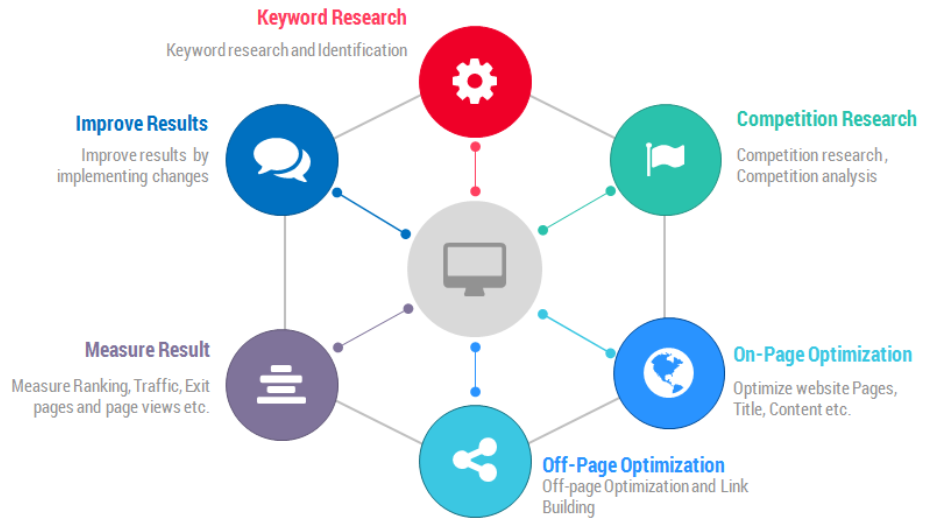Related Keywords Finder
The Related Keywords Finder tool helps you discover relevant and related keywords to enhance your SEO strategy and content creation. This tool is perfect for SEO professionals, content writers, and marketers who need to expand their keyword lists and find new opportunities for ranking. The process is easy and efficient, providing a comprehensive list of related keywords to improve your visibility and traffic.
Share on Social Media:
Top Free Related Keywords Finder Tools for Streamlined SEO Research
Looking for an edge in SEO? A related keywords finder can be a game-changer. Identifying related search terms is a step beyond basic keyword research, offering the potential to connect with your audience more effectively. This article introduces essential free tools that help you find and leverage these keywords, giving you practical insights for boosting your site’s visibility in search results.
Key Takeaways
The ‘Related Keywords Finder’ tool from PagesTools.com provides a list of up to 350 related keywords along with search volume data, helping users form the foundation of their SEO efforts and prioritize an extensive list of keywords based on relevance, search volume, and competition level.
Long tail keywords are essential for effective keyword research as they are less competitive, more specific, account for over 70% of search queries, and enhance content relevancy for improved SERP rankings and ad relevance in Google Ads campaigns.
The landscape of keyword research tools offers a range of both free and paid options tailored to different SEO objectives; for instance, Google Keyword Planner for PPC campaign insights, and advanced techniques like AI and Google Trends for discovering trending and declining keywords to stay ahead in SEO.
Exploring the "Related Keywords Finder" by PagesTools.com

Imagine having a tool that doesn’t just spit out a list of keywords but goes the extra mile to provide related keywords alongside their search volume data. That’s exactly what the “Keyword Magic Tool” from PagesTools.com offers. Designed to assist in SEO and content strategy, this tool analyzes up to 100 related keywords, ranking them by search volume to highlight the most important keywords.
It’s a simple yet efficient process: input a specific search term you wish to rank for, and watch as the tool generates a list of related keywords for you.
Benefits of Using Related Keywords Finder
From generating a comprehensive list of keywords to identifying low-competition keywords indicated by low KD scores, the benefits of using the Related Keywords Finder are numerous. This tool offers the following benefits:
Forms the foundation of your SEO efforts
Allows you to organize and prioritize an extensive list of keywords
Provides information on relevance, search volume, and competition level
It’s like having a secret weapon in your SEO arsenal that not only aids in identifying the most relevant keywords for your business but also uncovers those hidden gems - the keywords with low competition but high potential.
How to Use the Related Keywords Finder Effectively
Learning how to effectively use the Related Keywords Finder tool can significantly optimize your SEO efforts. Here are the steps to follow:
Familiarize yourself with the user interface of the tool.
Input your initial seed keywords into the search feature.
Generate a list of related keywords.
As you review the suggested keywords, take note of both the search volume and relevance to your content or SEO strategy.
By following these steps, you can make the most out of the Related Keywords Finder tool and improve your SEO.
The tool doesn’t stop at generating keywords. It comes equipped with analytical features like search volume and competition metrics, which aid in prioritizing which keywords to target. For paid search campaigns, the tool offers the flexibility to choose keywords and decide on the appropriate match type, including broad match, phrase match, or exact match. The best part? You can conduct keyword research regularly to stay updated with industry trends and changes in search patterns, ensuring that your chosen keywords remain relevant and effective.
Crafting a Robust Keyword Strategy with Related Keywords

Diversifying your keyword strategy is crucial in the ever-evolving world of SEO. This means going beyond the obvious and focusing your keyword research around specific products or topics. By doing so, you can discover the most relevant terms to your audience, and using related keywords can significantly enhance your brand’s visibility, potentially leading to better rankings in search engine results pages.
It’s all about understanding the search intent behind each keyword and creating content that resonates with target audiences while aligning with natural search trends.
Identifying High Volume Keywords with Related Searches
Finding high volume keywords can be likened to striking gold in the world of SEO. These keywords are determined by several factors, such as:
search intent
competition
industry type
seasonality
For instance, in a niche industry like collectible vintage typewriters, a keyword with 500 monthly searches might be considered high volume due to the specialized market context, its keyword difficulty, and the overall keyword search volumes in this field.
Tools like Google Trends and Ahrefs’ Keywords Explorer can be incredibly helpful in this regard, allowing you to find rising and breakout keywords related to a search query.
Prioritizing Keywords for Content Creation
With your list of high volume and related keywords at hand, it’s time to prioritize these keywords for content creation. Using filters in keyword research tools can help you identify low-difficulty keywords that also have good search volume and traffic potential. Remember, the goal is to ensure that the content you create is relevant to users’ search intent and matches the keyword’s relevance.
After all, the more relevant your content is to the keyword, the higher the chances of your site ranking well on search engine results pages.
The Art of Finding Long Tail Keywords

In the quest for effective keyword research, long tail keywords cannot be overlooked. These are phrases typically made from three to five words that target niche demographics, are less competitive, and reflect more detailed user queries. Long tail keywords are your secret weapon for targeting niche markets more effectively and attracting high-quality traffic that closely matches your content.
With over 70% of search queries being made using these longer, more specific phrases, ignoring long tail keywords is no longer an option.
Diving into Long Tail Keyword Opportunities
Long tail keywords offer an ocean of opportunities. Thanks to their specificity, they lead to more targeted traffic that closely matches the content offered. They face less competition, allowing brands to capture niche markets more effectively. Moreover, targeted traffic from long tail keywords often results in better SERP rankings because it closely aligns with the user’s search intent.
In essence, the specificity of long tail keywords not only improves ad relevance but also enhances the Quality Score in Google Ads, offering an incredible opportunity for brands to refine their SEO strategies and improve their online visibility.
Integrating Long Tail Keywords into Your Content Strategy
Having discovered the goldmine of long tail keywords, it’s time to integrate them into your content strategy. Prioritize both the relevancy to your site and audience and the search volume when selecting long tail keywords for integration into your content.
Mapping buyer personas to customer journey stages is critical for identifying the most appropriate topics and long tail keywords for each phase, ensuring effective targeting through the content.
It’s also essential to continuously monitor the performance of content featuring long tail keywords, tracking traffic and engagement to ensure that it is meeting user needs effectively.
Competitive Edge: Analyzing Keywords Against Competitors

In the race to SEO success, analyzing keywords against competitors can give you a competitive edge. Tools like SEMrush and Ahrefs can help determine which keywords are driving traffic to competitor domains. This can reveal areas where your domain can improve rankings and spot emerging opportunities not yet capitalized on. You can also understand where your domain outperforms competitors and leverage these advantages in your SEO strategy.
Furthermore, benchmarking your domain’s search performance by identifying SEO or PPC leaders for high volume search terms can offer valuable insights.
Benchmarking with Competitor Keyword Lists
Benchmarking with competitor keyword lists is an effective way to improve your keyword selection and SEO strategies. Tools like Ahrefs’ Site Explorer can reveal valuable long-tail keywords that your competitor ranks for and could be targeted by your SEO campaigns. Competitive research modules allow you to compare organic and paid search metrics against up to four competitor sites, providing insights to benchmark your keyword performance comprehensively.
Leveraging SERP Analysis for Strategic Insights
Leveraging SERP analysis can give you strategic insights into keyword targeting. Tools like Organic Research tool can provide detailed organic ranking information for each keyword that a competitor’s site ranks for. A SERP analysis must evaluate the type of sites and content ranking, ensuring that the traffic from those keywords is conducive to the business’s goals.
It is also crucial to monitor whether competitors are targeting your branded keywords in their paid campaigns and assess the resulting traffic they acquire. After all, the best keyword research tools are those that provide essential data for strategic insights.
Navigating Through Keyword Research Tools Landscape

In the landscape of keyword research tools, there are a plethora of options, each offering unique features and capabilities that can enhance SEO strategies by uncovering related keywords. Whether you’re using Moz Keyword Explorer considered the best all-around SEO keyword research tool, or Google’s SERP features like ‘People Also Search For’ and ‘Related Searches’, each free keyword research tool serves distinct aspects of SEO.
The choice of the appropriate free keyword research tool is crucial for aligning with specific SEO objectives and maximizing the potential of available SEO resources.
Free Keyword Tool Showdown: Which Suits You?
When it comes to free keyword research tools, the choice can be overwhelming. PagesTools.com's Free Keyword Tool provides hundreds of keyword results along with insights into competition level and estimated cost-per-click. Ahrefs’ Free Keyword Generator, on the other hand, includes up to 150 keyword suggestions, aiding in a breadth of keyword discovery without cost.
Moz’s Keyword Explorer even offers a ‘Priority’ score to simplify keyword research by evaluating the value of keywords, assisting in selecting high-potential keywords with less effort. The ultimate choice depends on your specific SEO needs.
Paid vs. Free Keyword Research Tools: Making the Right Choice
Choosing between free and paid keyword research tools often comes down to your specific needs and resources. While PagesTools.com
Free SEO Tools provide up to 350 keyword suggestions and Semrush offers 10 analytics reports per day in their free plans, paid tools like Moz Pro offer 150 keyword queries without such restrictions.
The decision to invest in a paid keyword research tool should consider the need for more extensive keyword queries, deeper analytics, and the potential for higher returns on investment in SEO strategies.
Enhancing PPC Campaigns with Related Keyword Insights
Related keyword insights can significantly enhance your PPC campaigns. Tools like the Google Keyword Planner are recommended for researching and selecting paid keywords to target in PPC campaigns. The tool’s forecasting features help advertisers predict performance and plan budgets effectively for PPC campaigns, thus ensuring that your campaigns are optimized for maximum returns.
Boosting Ad Relevance with Related Search Terms
Boosting ad relevance with related search terms can significantly improve your PPC results. For instance, incorporating local elements such as ‘near me’ into long tail keywords can significantly benefit local businesses by attracting potential customers who are looking for products or services in their immediate vicinity. This not only improves ad relevance but also enhances the Quality Score in Google Ads, leading to more effective PPC campaigns.
Crafting Compelling Ad Copy with Targeted Keywords
Crafting compelling ad copy with targeted keywords is a vital part of effective PPC campaigns. Here are some tips to help you integrate targeted keywords in your ad copy:
Place keywords in the ad headline to enhance the ad’s click-through rate and conversions.
Test different placements of keywords within headlines and descriptions to see which performs best.
Use keywords strategically throughout the ad copy to improve relevance and quality score.
By following these tips, you can optimize your ad copy and improve the performance of your Google Ads.
The key here is to continuously test and optimize your ad copy for maximum effectiveness.
Maximizing Organic Keyword Research with Advanced Techniques
In the realm of organic keyword research, advanced techniques can give you a competitive edge. Whether it’s using Google Trends to find trending keywords or Google Search Console to identify declining keywords that may need attention, these tools can significantly enhance your keyword research process.
Filtering keywords by user intent, such as informational, commercial, navigational, or transactional, can refine keyword targeting and improve the relevance of content.
Beyond Basic Search Queries: Advanced Keyword Analysis
Advanced keyword analysis goes beyond basic search queries. Tools like Google’s Ad Planner and Search Console, which are part of search engines, provide data on estimated keyword query volumes and the performance of specific search queries, which are essential for understanding user intent and traffic potential.
Google Trends helps to surface trending topics, allowing for the identification of seasonal trends and emerging interests before they become widely recognized in traditional keyword research tools. All this data ensures that your keyword analysis is accurate and reflective of audience search behavior.
Utilizing AI and Machine Learning in Keyword Discovery
Advanced technologies like AI and machine learning can significantly augment the keyword discovery process, providing you with valuable keyword ideas. These technologies can analyze large datasets for patterns and trends, offering insights that might not be easily visible otherwise.
For instance, using ChatGPT for keyword research involves prompting the AI with queries such as ‘give me a list of terms related to…’ to obtain related keyword lists. This can greatly simplify the keyword discovery process and provide you with a wealth of potential keywords to target.
Summary
In a nutshell, effective keyword research is a crucial part of any successful SEO strategy. With the right tools and techniques, you can uncover related keywords, prioritize high-potential keywords, and craft compelling ad copy. Whether you’re using free keyword research tools or investing in paid ones, the ultimate goal is to align your keyword research efforts with your specific SEO objectives. Remember, the world of SEO is ever-evolving, so stay updated with industry trends, regular keyword research, and continuous optimization of your SEO strategies.
Frequently Asked Questions
What is the "Related Keywords Finder"?
The "Related Keywords Finder" is a helpful tool developed by PagesTools.com to assist in SEO and content strategy by providing related keywords and search volume data.
What are the benefits of using the Related Keywords Finder?
Using the Related Keywords Finder can help you generate a comprehensive keyword list, identify low competition keywords, and prioritize keywords based on relevance, search volume, and competition level.
What are long tail keywords?
Long tail keywords are phrases made from three to five words that target niche demographics, are less competitive, and reflect more detailed user queries. They are a valuable SEO strategy.
How can related keyword insights enhance PPC campaigns?
Related keyword insights can refine PPC target keyword selection by using tools like Google Keyword Planner for researching and selecting paid keywords to target in PPC campaigns. This can lead to more effective and targeted ad campaigns.
How can AI and machine learning technologies be utilized in keyword discovery?
AI and machine learning technologies can simplify the keyword discovery process by analyzing large datasets for patterns and trends, providing a wealth of potential keywords to target. This can be a valuable tool for improving search engine optimization for websites.